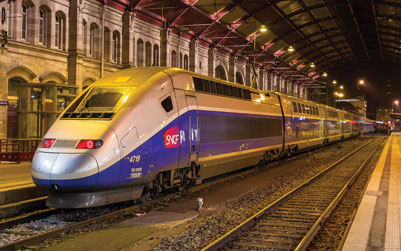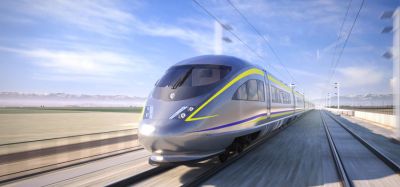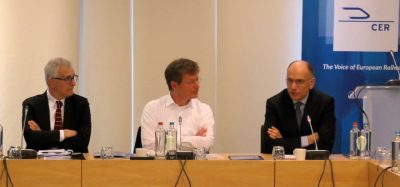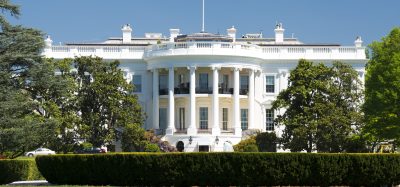The French railway reform and other European policy matters
Posted: 3 December 2014 | | No comments yet
2014 may not have run its full course quite yet, but it has already been marked in France by the adoption of the French railway system reform in early-August, therefore heralding the advent of a new public-sector organisation englobing SNCF and the infrastructure manager set-up in 1997, RFF (Réseau ferré de France). Jean-Pierre Audoux – Director General of the French Railway Industry Association (FIF) – outlines the key elements in this controversial decision and the factors going forward to ensure success is delivered in the longterm, plus commenting on the other work the FIF is involved with on several strategic European policy issues…


In the wake of the National Railway Conference in the autumn of 2011, all the sector stakeholders including the State have come to the realisation that the business model currently used for the French railway system is no longer sustainable given its recurring losses (ranging from €1.5 billion to €2 billion annually) and its increasing debt burden (€36 billion in 2011, and forecast to reach €65 billion by 2025).
Hence the decision made by the State, immediately after the election of François Hollande as the new President of France in May 2012, and following the parliamentary majority subsequently secured by the socialist party, to start working on a new project underpinned by the following principles:
- Reconstitution of an ‘integrated enterprise’ to culminate in RFF reintegration with the ‘SNCF Group’
- Return to a ‘strategic role’ for the State at the helm of a high-level railway committee
- Non-involvement of the Regions in the governance of the new system
- Non-opening of the rail passenger sector to competition before the deadlines set by the UE institutions (2019? 2022?)
- Retention of the railway-staff status in force since 1938
- Widening of the competency scope of the Office of Rail Regulator (ARF) to include economic issues.
Like numerous other French rail system stakeholders, the French Railway Industry Association (FIF) had voiced its preference for a reform primarily focused on economic performance and competitive emulation as a way of imparting ‘virtuous dynamism’ to the former model.
The British and German rail system models in particular were explored with keen interest. The model finally adopted for France, patterned on the German DG AG organisation at least from the ‘strategic enterprise’ standpoint, is structured around a SNCF Holding, the competition element (the case of regional transport segment) having been discarded by France.
The railway manufacturing sector in France will thus operate within a simpler, but also more monolithic environment in that all public railway procurement contracts for trains and infrastructure alike will depend directly on SNCF through one of its two components: SNCF Mobility (rolling stock + on-board signalling) and SNCF Network1 (infrastructure + ground signalling).
The Business model for railways in France will, more or less, reproduce the pre-1997 scenario – before the creation of RFF – the slight difference in 2014 residing in:
- The introduction of modest competition in the rail freight sector (six operators in competition with SNCF Freight – including VFLI – accounting for 1/6th of the domestic market)
- The existence of a railway safety authority (ARF).
The key question flowing from this arrangement is whether the new French railway system and the ‘new SNCF’ will succeed in generating more investments, higher traffic volumes whilst also delivering improved economic performance.
We of course earnestly hope so, but doubts do remain.
In this regard the major concern that the State and the SNCF Executive must address revolves around the compatibility between new economic ambitions and the acceptability – by the social corpus and therefore by the unions – of the efforts that need deploying if the operating and investment costs of the enterprise are to reduce significantly.
Aside from this major France-specific issue, the FIF is directly involved in work on several strategic European policy issues; the first of which relates to the Fourth Railway Package which has both a political element and a technical element to it. Their implementation and content will have a decisive impact on the European railway landscape for decades to come.
The FIF has worked tirelessly to progress the technical element, which covers safety, interoperability and the future role of the European railway safety agency. The stakes are high in that they centre on making the European railway mode intrinsically more competitive through significant alleviation of the technical and administrative obstacles existing between EU member countries.
This process calls for, in particular, simplification of equipment acceptance formalities and the concentration of applications within the European Railway Agency (ERA), which will then operate as a ‘one-stop-shop’ and supervise the national railway safety agencies.
The FIF not only works with UNIFE to develop and disseminate common industrial policy positions, but also with the French State to defend these positions and convince France to promote and articulate them within the EU Council, ensuring of course that these positions are also passed onto the Parliamentarians so that convergences are swiftly achieved.
In terms of the political element, where it necessarily plays a lesser role, the FIF nevertheless strongly supports the principle of regulated market liberalisation, which will ultimately energise the rail transport mode and so result in increased market shares, higher investment levels and extra orders for railway manufacturing industries.
The second strategic policy issue relates to the European SHIFT2RAIL research and innovation programme. This programme, for which a budget of some €1 billion has been earmarked spread over seven years, is a ground-breaker for the EU and its railway manufacturing sector.
SHIFT2RAIL is a PPP-type initiative which, through the development of demonstrators, aims to address a wide range of issues crucial to the European railway system and to the competitiveness of the railway manufacturing sector at world level. The FIF has lobbied the French authorities to ensure that France supports this programme, at the same time as canvassing sector SMEs for them to engage, with its support, in Innovative Programmes (IP) relevant to their activities.
At a time when Asian competition from countries like China, Japan and South Korea is gathering strong momentum on the world railway marketplace, and when simultaneously road transportation is gaining further competitive advantage courtesy of information and communication technologies, the SHIFT2RAIL programme is seen as having a highly strategic role to play. A successful outcome to the programme is therefore an absolute must.
The third dimension to the action driven by the FIF centres on its participation in the work of the Technical Committee 269 ‘Railway Applications’ set-up in 2012 within the ISO following a Franco-German initiative. This particular action intends to develop international standards (ISO standards) modelled on European Standards in force; the aim being to facilitate railway equipment exports through maximum harmonisation of the technical requirements and mandatory tests in a bid to eliminate the technical obstacles observed on export markets.
This type of action is also a means of promoting the technologies and knowhow of European and French enterprises. Besides, it dovetails with a much broader range of actions coordinated with UNIFE and pertaining to EU overseas commercial initiatives. Other obstacles such as outrageous-localisation or local-content constraints as well as certain tender-call exclusion clauses, not to mention insufficient cover for public-procurement contracts, restrict opportunities for our enterprises and must therefore be removed parallel to the gradual convergence of standards. All this forms part of the economic intelligence package made available to its members by the FIF.
By way of conclusion, the FIF is duty-bound to be present – as is already the case – at all French, European and indeed world geo-economic levels where such matters are debated, where exchanges take place and where influence can be exerted; never forgetting that the future of our railway manufacturing industries is actually being played out at every one of these levels.
Action ‘ethno-centred’ solely on the French railway manufacturing sector would simply lack pertinence at the very time when its future basically depends on the ability of the European railway concept to become a reality and that of its industries to regroup, also on the capacity of the railway mode to innovate at least as effectively as road transportation.
This indeed is the journey on which the FIF has embarked, with a clear commitment to engaging more decisively so that the ‘Ambition 2020’2 course set for our railway manufacturing industries delivers success at the end of the day!
References
- SNCF Network = RFF+SNCF Infra+ Railway Traffic Division (DCF).
- April 2012 Report ‘Ambition 2020’ produced by the Rail Sector Strategic Committee.
Biography
Jean-Pierre Audoux is a Doctor in International Economics and is also a graduate in Macro-Economics. In 1996, Jean-Pierre was appointed the new Director General of the French Railway Industry Association (FIF) after a 15-year career in various governmental departments including the Ministry of Industry, the Defence Ministry and the Prime Minister’s Office. Jean-Pierre is also the author of books on geo-economics and of numerous articles on the railway sector. For many years Jean-Pierre has also been an Associate Professor in Economics in Advanced Studies at colleges such as the Paris College of Commerce, the Saint-Cyr Military Academy and the International Public Administration Institute.






